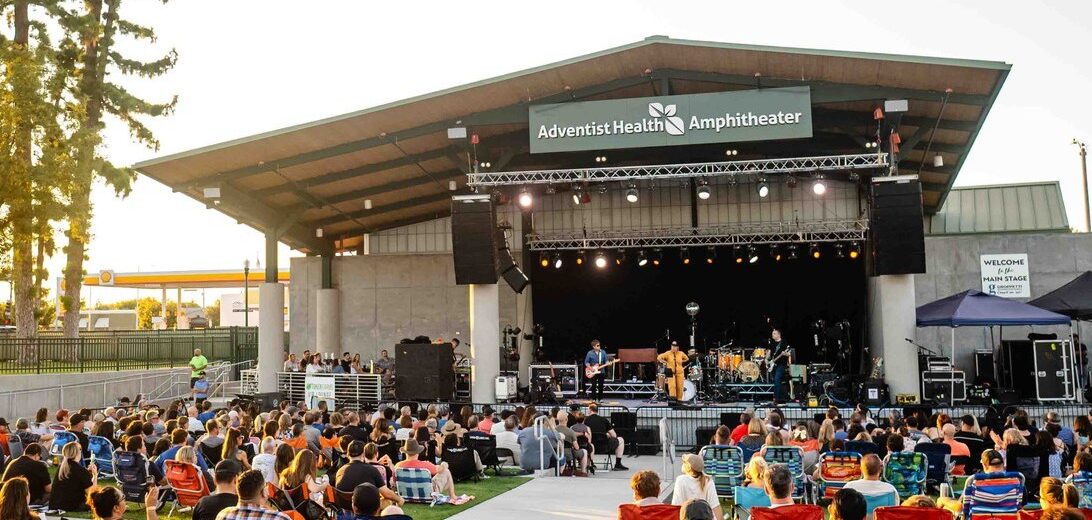
Photo via Spade Entertainment | Adventist Health Amphitheater in Tulare opened in May, with owner City of Tulare and promoter Spade Entertainment acknowledging it may take up to three years to become self-sustaining.
Written by Dylan Gonzales
The City of Tulare is moving forward with a plan that would temporarily use general fund reserves to help cover operational costs for Adventist Health Amphitheater at Zumwalt Park.
Marc Mondell, Tulare’s city manager, said that the venue, which opened in May, has already attracted visitors from well outside of Tulare for concerts.
“From those concerts, we’ve attracted people from 18 different states, and I think over 200 cities,” Mondell said. “Our goal is to try to balance our costs with the revenues that we derive from the concert series.”
Mondell, who has helped develop two other venues throughout his career, said that the city anticipated that the first few years of Adventist Health Amphitheater would be somewhat of a challenge financially.
“I told the city council from the beginning, this is going to take us about three years to stabilize this facility,” he said. “We’re probably at about half of where we thought we would be [in ticket sales.]”
Another challenge has been getting local Tulare residents to attend events at Zumwalt Park.
“We’ve only had about 6% of our attendees be local Tulare residents,” Mondell said. “We monitor all of those things and we keep tweaking them. We want to continue to show this to people, try to attract more sponsors. It’s a whole machinery that happens behind the scenes.”
Todd Speelman, the owner and lead producer for Spade Entertainment, which promotes for Adventist Health Amphitheater, said that he and his team expected a slower start and are working to increase attendance.
“We’re investing a lot of money in marketing to try to take it up a notch, spending a lot more than we normally would spend,” Speelman said. “We’re also utilizing our sponsors’ databases and sending out special offers to get people to the venue to see the venue and know that it’s there.”
Despite the slow start in ticket sales, Mondell remains optimistic about the future of the venue.
“It’s not quite as bad as you would think,” he said. “We really do believe that with tweaking a few more things, we’re working on those, and we think we’re going to be able to get those ticket sales up. I don’t know if
it’ll be by the end of this year. I think there’s a very good chance of it by the end of next year, and certainly by year three.”
He said that the city is keeping a consistent track of financial and economic impact metrics.
“Our goal has been to try to attract about 35,000 to 50,000 people through the park, through the venue, to downtown a year,” Mondell said. Noting that many outside visitors contribute hotel tax, sales tax and gas tax revenues.
Spellman noted that the amphitheater is planning different types of programming beyond concerts to help it become self-sustaining.
“We’re planning next year some really cool events,” he said. “We are doing this year, a four-day Christmas event, and we’re tying into the big parade that the city of Tulare does with the Downtown Partnership. “I’m also working with some other promoters throughout the West Coast that want to bring events to Tulare.”
In July, the City Council approved a resolution to use up to $400,000 from general fund reserves, replenished as naming rights payments from Adventist Health are received.
“We never had a conversation with council on what we should use that money for,” Mondell said. “My recommendation was to use that naming rights money to cover these expenses.”
Mondell added that the amphitheater is seeing diverse community uses beyond concerts.
“We had free concerts in the park of regional talent, free yoga in the park, a free CrossFit class and a free line dancing class,” he said. “We have other parties, nonprofit events and school plays or musical productions.”
The park has hosted events from movie nights drawing 500 attendees to upcoming car shows and holiday celebrations.
Programming decisions are shaped by the venue’s size, technical capabilities and artist costs.
“Our venue holds a maximum of 5,500 people,” Mondell said. “The artists that we pursue, they’re more in the range of $25,000 to about $150,000 per show.”
Mondell stressed the importance of patience and strategic growth.
“When you start a new business, most typically it’s not profitable from year one,” he said. “Our goal is to eventually cover our costs. It takes time, and I won’t know that for two or three years.”








